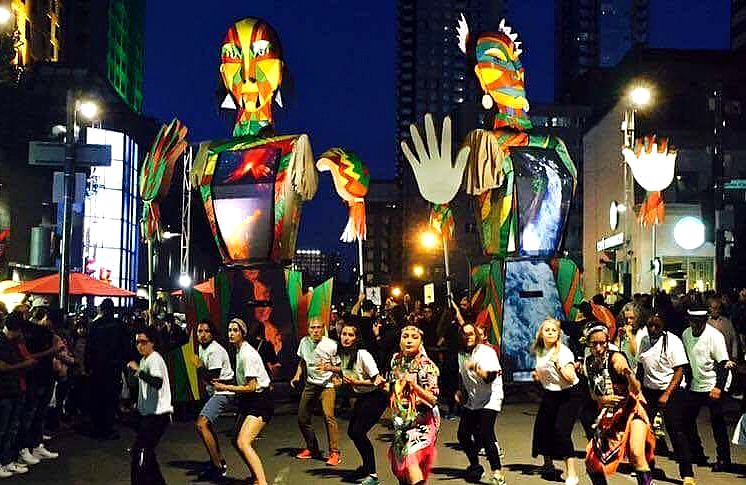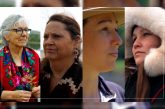
Ioskeha et Tawiscara: The Great Game of Creation performance| Image source: Presence Autochtone Facebook
This year marks the 27th year that André Dudemaine (Innu) leads the organizing committee for the Montreal First Peoples Festival, grounding Indigenous cultural experiences and history within the city. This year the festival brings in exciting acts like, Silla and Rise, highlights short films made by emerging Indigenous filmmakers from around the world, and celebrates the Kanien’kehaka- Haudenosaunee creation story. As the First Peoples Festival gets under way, André Dudemaine took time out of his busy schedule to speak with MUSKRAT Magazine and give insight into the festival’s beginnings and advice organizing culturally rooted experiences.
MM: As an Indigenou arts trailblazer, you co-founded Land In Sights back in 1990 with Daniel Corvec and Pierre Thibeault- which was the driving force behind the Montreal First Peoples Festival, what motivated you to establish the Festival and how has it evolved over the years?

AD: When we first founded Land In Sights, the Oka Crisis was happening at the same time, so the beginning was difficult and there was no support at all. We hosted some benefit shows that helped us with the start of the festival, so we can really say that it was the artists that have brought the festival to birth. We grew slowly after that, but the first big event that put us in the forefront was when we reached an agreement with Pointe-à-Callière, a museum of archaeology and history in Old Montréal, to commemorate The Great Peace of Montréal in 2001. This celebration was really important during that summer. After that we took our place in the cultural landscape within the city. We then advocated really strongly to host the festival at Place des Festivals, a huge space designed for all the mainstream festivals in Montréal. At first they said no, until we persisted and they finally said yes. Now, everyone is happy to see the festival grow in public representation, artistic quality and international visibility.
MM: Montréal 375 has partnered with First Peoples Festival to create the theatre production, Ioskeha et Tawiscara: Le Grand Jeu de la Creation, which pays homage to the Kanien’kehaka/Haudenosaunee creation story. You were listed as being responsible for creating the concept. Why did you want to tell this story this year?
AD: This is the oldest story that we are coming back too. It is taking its due place in the land where it was told thousands of years ago. This is a way to reconnect with the spirit of the people who have been erased by the kind of organization that rejected the Indigenous way. It’s kind of a feat for us.
The production will have two huge figures representing the twin brothers which will be transported along St. Catherines Street. They will start at two different corners with the rest of the creation story taking place at different stations along the way until it reaches the Place des Festivals where they will have their final fight. This year Ziibiwan Rivers, a young Anishinaabe DJ, will be responsible for the music along the platform itself. Maybe in the future it will be live music or kind of a sound presentation. This is something that is not here only for one year, but something that will be at future festivals. We’re hoping this will become a landmark for Montréal.
MM: What has the dialogue been like in Montréal regarding the colonial effects on Indigenous peoples while celebrating Canada 150 in conjunction with Montreal 375?
AD: Well there are big plans to Indigenize the city somehow, they call this reconciliation. I don’t know if it’s reconciliation yet. I would rather say this is the first necessary step towards reconciliation. The city has a committee with Elders from different nations that will make recommendations to change place names around the city to include Indigenous heritages in this symbolic representation.
We have also worked hard in recent years for a permanent Indigenous cultural centre in the city and that project is going really well. We may have an announcement in the fall. It’s obviously too big of a project for the city alone, so we need the support of the city to get the federal and provincial governments involved.

MM: In the aftermath of the following scandals: Dominic Gagnon’s making of the racist “Of The North’ screened by Montréal International Documentary Festival (RIDM), APTN’s story on Joseph Boyden’s tenuous Indigenous roots, and Write Magazine’s former editor Hal Niedzviecki stating that cultural appropriation should be encouraged – important issues of cultural appropriation and misrepresentation of Indigenous communities and culture are now at the fore in Canada. A need for education on respecting Indigenous arts protocols has never been stronger. What is your advice to both Indigenous and non-Indigenous artists whose artistic practices centre on Indigenous storytelling? How do we approach Indigenous storytelling in a good way?
AD: We need authenticity, which means that artists need to connect to the Elders, the tradition and the land. If non-Indigenous artists want to do Indigenous work they have to work with Indigenous artists, take their advice and give them the means to take control of their own work. The festival has a multi ethnic work team, but we always work with the stories and visions of Indigenous artists. Others are there to help and learn what the real authentic traditions are of this land. That is what’s most important.
We are also almost sold out of the premiere of the short film by Stephen Agluvak Puskas, who is an Inuit artist and activist living in Montreal. He has a short film that is a response to “Of the North.” This film is also made with home footage, but he got authorization from each and everyone who put those images on the internet, whereas Gagnon didn’t. He also gave more of an accurate image of the north because he knows the subject intimately and understands Inuktitut. That makes a big difference.
Artist Bio

Born in 1950, André Dudemaine, an Innu, has made a name for himself as a producer and cultural facilitator. He has taken part in community education projects in Abitibi-Témiscamingue (1974-1976), and produced several television programs broadcast on Radio-Québec’s Quebec-wide network (1977-1984). A co-founder and chair of the Regional Cinema Week in Abitibi-Témiscamingue (1975), the starting point for the later Abitibi-Témiscamingue International Festival, he produced Abijévis, an experimental short selected at Belfort Festival in France (1984-1986) and assisted Arthur Lamothe in production of the documentary feature L’écho des songes(1986-1988). An editor at the journal L’Artère (1988-1990), he is also co-founder and editor-in-chief of the journal Terres en vues (1993-1995). At the Concordia University Film Studies department, he has been the lecturer for the First Nations and Film class (2000-2001). He has received several awards on behalf of Land InSights, of which he is a founding member (1990) and director of cultural activities. He was one of the recipients of the First Peoples’ Business Association’s Mishtapew excellence award in 2001, 2002 and 2003. The Quebec National Assembly also awarded him the Jacques-Couture award for intercultural rapprochement (2002) as chair of the Corporation des fêtes de la Grande Paix de Montréal (1701-2001).









